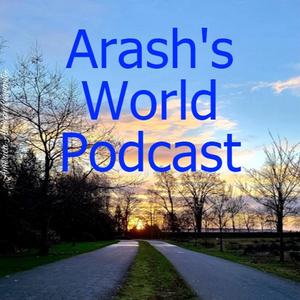Sigourney Award Recipient, Psychoanalyst, ex-President of the International Psychoanalytical Association
YouTube: “Arash’s World Interview with Sigourney Award Recipient Virginia Ungar on Youth and Psychoanalysis”
Podcast: “Psychoanalysis as a Playground for Healing: Working with Children, Adolescents, and Technology with Sigourney Award Recipient Virginia Ungar”
In this episode, I have the great pleasure of speaking with Sigourney Award Recipient Virginia Ungar, psychoanalyst and ex-president of the International Psychoanalytical Association. She shares with us her own encounter with psychoanalysis and the general and ubiquitous presence and prevalence of this fascinating field in her home country Argentina.
Dr. Ungar works mainly with children and adolescents and shares the many joys of working with this age group as they have not only different insights and worldviews but also a lot to teach and to give to everyone around them.
Yet, they also have their unique difficulties and challenges, especially having to deal with some of the drawbacks of technology and the current state of the world, which includes violence as well as the experience and suffering and after-effects of a pandemic.
Moreover, Virginia explains her own approach to psychoanalysis and that includes building new relationships and creating novelties. It goes beyond the interaction of two individuals, but it is a mutual and wonderful experience that touches both and creates something new, beautiful, and lasting out of this transformative interaction and encounter.
00:27: Personal Intro:
A woman. Born in Buenos Aires, Argentina. Lived all her life there. Wanted to become an analyst since university. Started studying anthropology. Had her first analysis at the age of 17 upon her father’s suggestion. Psychoanalysis famous and popular in Argentina with well-trained analysts. Went to medical school to become analyst. Learned about the functions of the body as well as about diversity by meeting other people. University free in Argentina. She is a product of public education. The description of herself: A woman, wife and mother, grandmother, a psychoanalyst, interested in every expression of culture. Also, first ever female President
of the IPA (International Psychoanalytic Association) from 2017 to 2021. And then became interested in politics.
04:50:
On the connection between psychoanalysis since Freud and anthropology and digging into the past. Digging you can find traces of the past. During psychoanalytic treatment one does not merely dig into the past but something new is also created at the same time within the analytic couple. Working with novelties and an analytic link with the encounter of two minds. Giving possibilities and offering your mind as a psychoanalyst as a playground where something new can be created.
08:44:
Focus on children and adolescents and challenges in terms of growing up with technology. Studied how information is given now. The change in culture. Psychoanalysis born in Victorian era with different conceptions of the roles of men and women, family configurations, sexuality. Freud brought about a huge revolution. But we have to take into account more the relationship with the external world. Her views Kleinian and Post-Kleinian in terms of analytic schools. But today we have to take into account the context. Children are raised in a different way now. Children and adolescents taught her a lot. First, they oblige you to talk in a simple way. Simple language to convey complex ideas. The most important part of their lives today is in media and inside their smartphones.
11:17:
Basically optimistic about technology. Taking account how someone uses technology. Psychoanalysis accepting it because it is reality in which we live. During the pandemic they made the necessary changes very fast. All the teaching, analysis, supervision done online with seminars and webinars. We needed to be in contact. Patients and analysts living in the same world.
16:08:
When psychoanalysis started all the focus was on the patient. Then, it was on the analyst because of countertransference. Then, the analytic link itself. Nowadays, we cannot exclude the context in which the analysis takes place. It’s important to listen to children. Let them now that if they feel anxiety, it is not an illness because everybody has anxiety. Let us talk about fears and anxieties. Pay attention to adolescents because big changes happen then. Going into the adult world nowadays is not easy.
19:11:
An “easygoing” child that has no symptoms or worries, they may be overadapting. To deal with emotions is not simple. And parents today are not able to give time to their children. Pressure to success (whatever that means) and having to earn money for the family and the children’s future. The culture to succeed and excel puts pressure on us all, parents and children alike.
23:33:
On the importance of playing. It’s not just playing with toys. It has to do with creativity, the most important part of our world. Playing heals according to Winnicott. The children’s is often equivalent to the adults’ dreams. Klein equated and evaluated play of children to the dreams of adults. If you don’t have a relaxing atmosphere, you will not remember your dreams.
26:26:
The effects of the pandemic on children and adolescents. They were aware of something that was terrible. They could potentially transmit the virus to their grandparents. An inversion of generations dealing with life. They had to take care of the elderly. We are still seeing the consequences. Kids suffering having trouble to sleep, eating disorders, phobias, or they don’t want to go out.
28:51:
In her playroom, her office, she does not offer electronic devices to her young patients. They tend to play with simple toys from the past. They play with what they have. Good to expose them to the arts, music, and dance.
31:35:
Why psychoanalysis is so important and relevant in Argentina. It is a country of immigrants and built up by them and who wanted to give everything to their kids. Giving them the opportunity to see an analyst for their own benefit and progress. Her own father suggested and introduced her to psychoanalysis. Most kids there know what analysts are.


